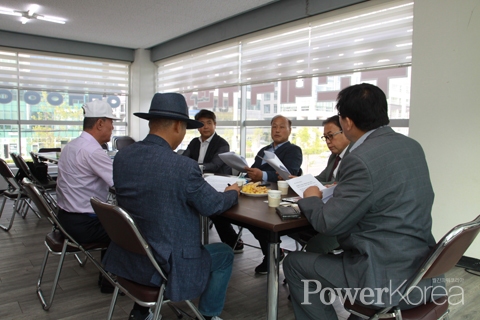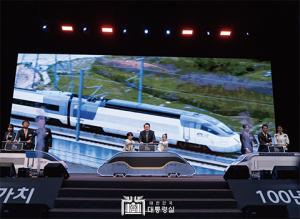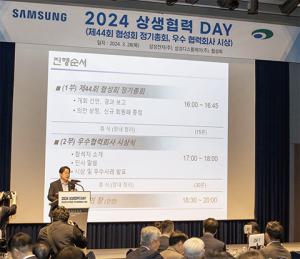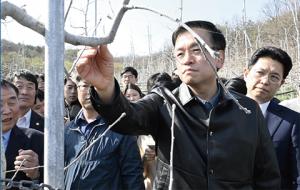 |
||
Compulsory purchase feeds businessmen only
Compulsory purchase must exclude transfer income tax but apply retroactively
Designation of public housing districts and 3rd phase new towns is wrong
Unrealistic land compensation laws must be revised
Cheap compensation for greenbelts is not welcome
Host: Jongwon Baek (Editor/CEO of <PowerKorea>)
Panel: Chaegwan Im (President of the Public Housing Districts Solidarity)
Jongkook Park (Chairman of the Seongnam Bokjeong Residents Committee)
Chulho Suk (Chairman of the Hanam Gyosan Residents Committee)
Byeongchan Lee (Hwaseong Eocheon Residents Committee)
Sukwon Hyun (Head of Advisory of the Public Housing Districts Solidarity)
<Editor’s Note>
The Public Housing Districts Solidarity held a rally against the government’s infringement of property rights in front of the National Assembly building on 27th June. Prior to the rally at 10 am on the same day, the Solidarity organized a meeting with lawmaker Unju Lee at the lawmaker’s hall. <PowerKorea> invited 5 board members of the Solidarity and heard about the problems and their suggestions.
Baek: The government’s designation of the public housing districts and 3rd phase new towns is causing noise nationwide at the moment. So I called you to join the panel today to discuss on what the problems are and the solutions might be.
Im: The government must stop immediately the housing policy that infringes the property rights of the residents in the public housing districts. This is the reason we formed the Solidarity last February. The government just threw us the designation of the areas without even consulting a word to us. As the representatives of the affected residents, we can’t help feeling that the government is abusing its power of compulsory purchase.
Lee: The most public housing districts in the capital area were bounded as greenbelts for the last 50 years and residents in the districts were disadvantaged in many terms. So the government must revise the unfair laws and regulations on land first before forcing us to accept their ‘compulsory purchase’.
Park: Cheap compensation also makes us feel ignored. I feel like the government robs my property and even imposes transfer income tax on me. Even if the transfer income tax law is revised, I think it must be applied retroactively.
Suk: The government is infringing ‘the principle of compensation’ stated in the Constitution. I suggest that we, the Solidarity, and the Korea Land and Housing Corporation and the Ministry of Land, Infrastructure and Transport should form a consultative body to bring up rational and fair solutions for this.
Hyun: The government seems to be stabilizing housing system in order to benefit ordinary people through compulsory purchase. Fine, no one might object this. But the problem is that the procedure is not right. Advanced countries take steps for public interest and benefit alongside thorough research and preparation prior to the execution. Japan, for example, consults to affected land owners, residents and specialists in the field in democratic way. China also brought up fair compensation policy in 2012. What it tell us?
Baek: What might be the solutions?
Im: I think the problems are the Special Act on Public Housing and the Land Compensation Act which are favorable to state-owned companies. The two acts are the base for them to exploit private properties. So the foremost solution is to revise these two laws fair and good for everyone.
Park: The profit generated by redevelopment must be shared by all interested party. In other words, the compensation must be done based on the market price right now. What government did was to bind the land by ‘officially assessed land price’ for decades and now buys the land at the price as stated decades ago, but not the land value today. It is just unbelievable. The government must offer realistic compensation to the residents.
Suk: I agree. The government must listen and work together with us in more democratic way.
Hyun: It is difficult to fight against the government individually. That’s why the residents in the affected districts gather together to deliver their voice to the government.
Lee: The government should open their closed ear to the voice of the residents why they are against the government and what might be the rational solutions for all. It is also important for the government to keep ‘the law of supply and demand’. If they see what they want to see and do what they want to do by ignoring this simple market law, there won’t be any rational solution.
Park: The current compensation policy based on ‘officially assessed land price’ is significantly low in the real land value now. So the laws must be revised not as part but as whole.
Im: In fact, there is regulation to listen to opinions of the resident in the affected districts but it is practically useless. The government has prevented the execution of private ownership of property on the ground of a variety of regulations and now is lifting the regulations on their own terms to sweep the benefits generated alone.
Lee: The government indeed listened to our opinion but it was only a pretension because there was not a single reflection of it into the execution.
Suk: The government started building apartments from 20 years ago by lifting the greenbelts. Back then, those who lived in the green zones were not allowed to add even a small storage. All of sudden, that harsh government is now developing the zones on their own terms without consulting a word to the residents in the zones.
Park: The land owners get substantial compensation by private land developers. But when it comes to the government, the compensation is just not reasonable. What I would like to suggest is that the government needs to bring up a fair compensation system and open all the costs and profits of the development to the land owners.
Im: It is common sense that the government compensates according to the price valued today on the market. But the Land Compensation Act is used as the base for the government to monopolize the profits generated by the development alone. In other words, the land owners are forced to sell their land at cheap price plus transfer income tax.
Lee: I strongly think that the government’s compulsory purchase is abuse of power and an act of exploitation. What age we are living today? I believe we are living in a democratic society?
Hyun: I think the solution seems to be quite simple. The government invites private developers and let the land owners choose a developer among them.
Suk: We also have to support the revised bill on the existing 10% reduction on compulsory purchase compensation.
Park: I think the amount of compensation must go through appraisal process. But the problem is that the appraisal process is done under the influence of the Korea National Housing Corporation or local governments or the Ministry of Land, Infrastructure and Transport. In other words, private land appraisers have no choice but to study the pleasure of the state-owned companies.
Hyun: To make things fair, the transfer income tax also must be exempt by 100% because we have to sell our property by force but not by our own will.
Im: The government should cancel its 3rd phase new town development plan and pour its effort instead into revising the related laws for fairness’ sake.
Baek: Thanks you very much for your time and opinions today. I hope the government would bring up fair and realistic compensations and laws.
강진성 기자 wlstjdxp@naver.com







